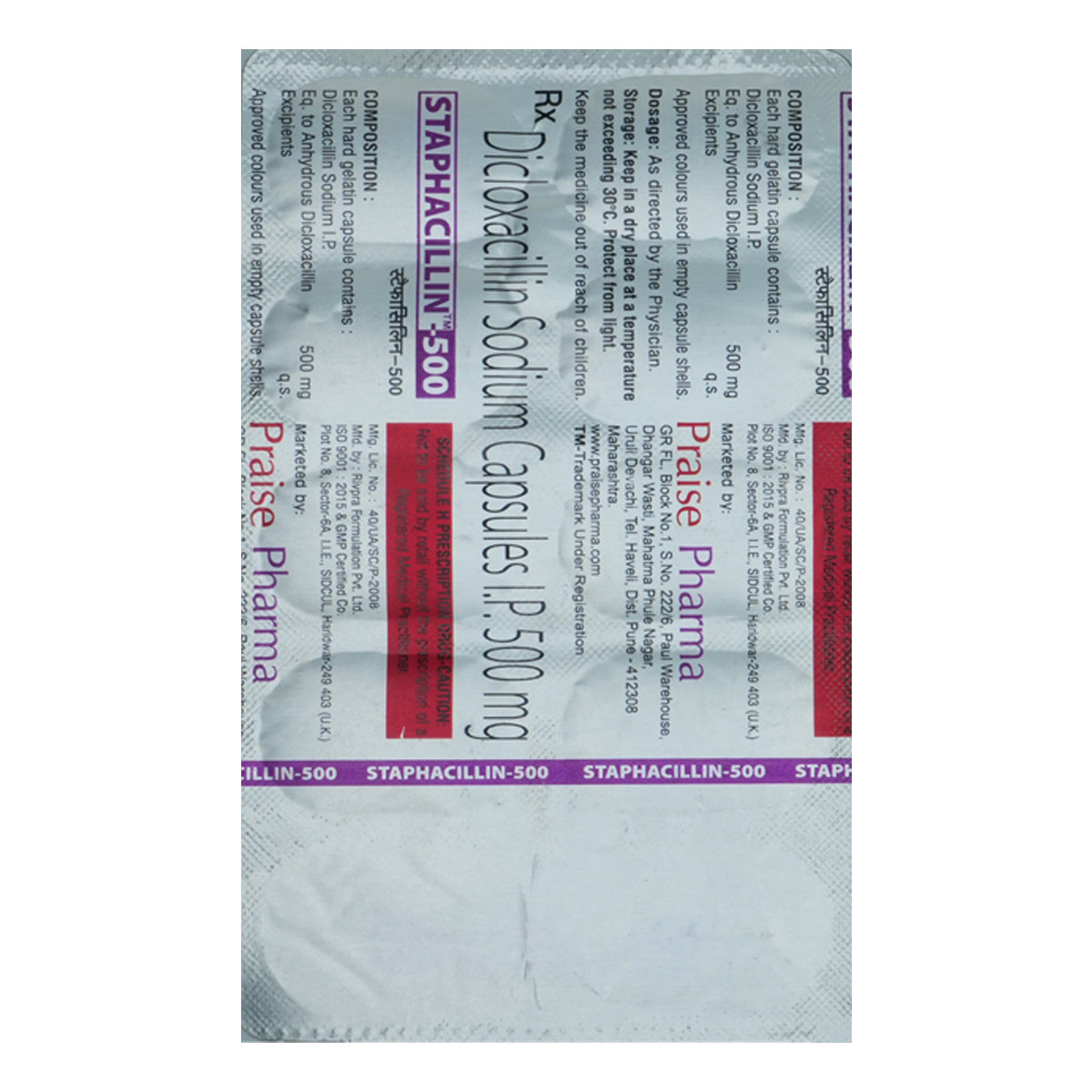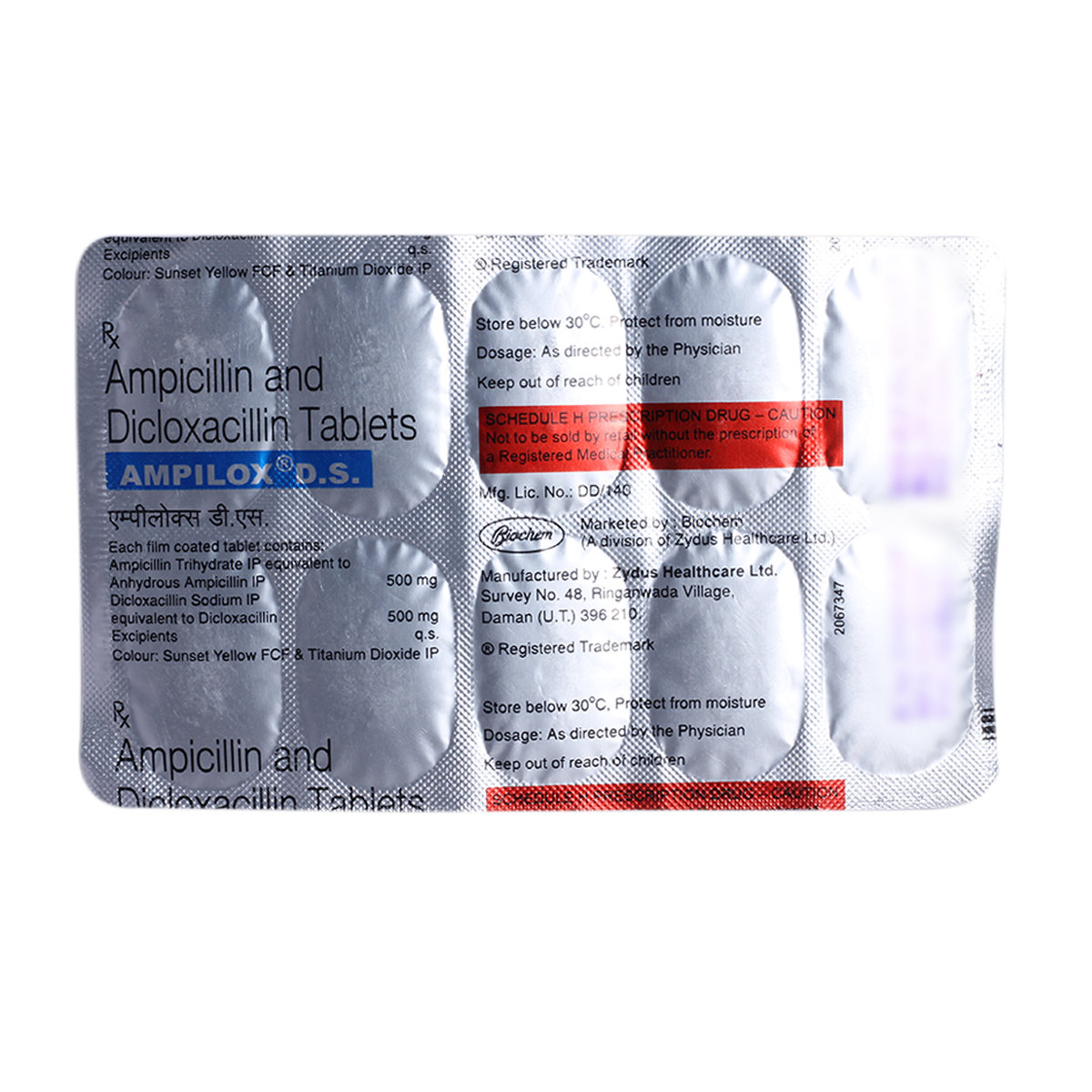Dicloxacillin
About Dicloxacillin
Dicloxacillin belongs to the 'antibiotics' class of drugs, primarily used to treat bacterial infections. It is used to treat various infections like bronchitis (inflammation of the lining of your bronchial tubes), pneumonia (infection in one or both lungs), or staphylococcal infections. Bacterial infection occurs when harmful bacteria grow in the body and causes illness. It can infect any part of the body and multiply very quickly.
Dicloxacillin contains Dicloxacillin, a penicillin antibiotic. It has bactericidal (ability to kill bacteria) activity against gram-positive and gram-negative aerobic (requires oxygen to survive) and anaerobic (survives with little or no oxygen) bacteria. Dicloxacillin binds to the penicillin-binding proteins (PBPs) inside the bacterial cell wall and inhibits cell wall synthesis.
Use Dicloxacillin as suggested by the doctor. Your doctor will advise the dose and duration based on the severity of your infection. Like all medicines, Dicloxacillin also causes side effects, although not everybody gets them. Common side effects of Dicloxacillin include heartburn, nausea, vomiting, diarrhea, red or swollen gums, and blisters/ulcers in the mouth. If any of these effects persist or worsen, seek medical advice promptly.
Brief your medical history to the doctor if you have any allergic reactions to antibiotics. Please inform your doctor if you have any liver, kidney diseases, bleeding disorders, and asthma. Do not use Dicloxacillin while having vaccinations with live bacterial vaccines (typhoid vaccine) since Dicloxacillin may affect the vaccine's activity. Dicloxacillin should be used during pregnancy only if the doctor advised you. It is also excreted into breast milk. Hence, it is recommended to consult your doctor if you are pregnant or breastfeeding before taking Dicloxacillin.
Uses of Dicloxacillin
Medicinal Benefits
Dicloxacillin contains Dicloxacillin that belongs to the class of penicillin antibiotics. It has a bactericidal action against gram-positive and gram-negative aerobic and anaerobic bacteria. It acts by binding to the penicillin-binding proteins (PBPs) inside the bacterial cell wall and inhibits its cell wall synthesis. This process further leads to cell lysis or death. Thus, Dicloxacillin helps treat various bacterial infections. Dicloxacillin does not work for colds, flu, or other viral infections.
Directions for Use
- Dicloxacillin should be taken on an empty stomach at least 1 hour before or 2 hours after a meal as advised by the doctor.
- Follow your doctor's instructions on the dosage and timing of this medication to ensure safety.
- Swallow Dicloxacillin as a whole with a glass of water.
- Do not chew, crush or break it.
Storage
Side Effects of Dicloxacillin
- Heartburn
- Nausea
- Vomiting
- Diarrhea
- Red or swollen gums
- Allergic reaction
- Blisters/ulcers in the mouth
Drug Warnings
If you have a history of any asthma, kidney disease, stomach problems (nausea, vomiting, digestive issues), bleeding disorders, and heart or liver diseases. Clostridium difficile associated diarrhea (CDAD) is reported during usage of antibiotics like Dicloxacillin. Therefore, please undergo an examination to rule out the chances of CDAD if you experience diarrhea following Dicloxacillin therapy. Let your doctor know if you are undergoing any vaccinations with live bacterial vaccines (like typhoid vaccine) since Dicloxacillin may affect vaccines' activity. Dicloxacillin should be used with caution during pregnancy. Dicloxacillin is also excreted into breast milk. Please seek medical advice if you are breastfeeding before taking Dicloxacillin. Sometimes, antibiotic medications can cause antibiotic resistance. In such cases, your doctor may prescribe other antibiotics, you are not resistant to.
Drug Interactions
Drug-Drug Interaction: Dicloxacillin may interact with anticoagulants (warfarin), anti-cancer drugs (methotrexate), and antibiotics (tetracycline).
Drug-Food Interaction: Avoid alcohol consumption while taking Dicloxacillin to prevent unpleasant side-effects, such as nausea and vomiting.
Drug-Disease Interaction: Before taking Dicloxacillin, let your doctor know if you have kidney disease, bleeding disorders, asthma, heart or liver diseases, and are undergoing dialysis treatment.
Drug-Drug Interactions Checker List:
Safety Advice

Alcohol
cautionAvoid alcohol consumption while taking Dicloxacillin to prevent unpleasant side-effects, such as nausea and vomiting.

Pregnancy
cautionIt is not known if Dicloxacillin affects pregnancy. Please consult your doctor before taking Dicloxacillin if you are pregnant or planning to conceive.

Breast Feeding
cautionDicloxacillin is excreted into the breast milk and may harm a nursing baby. Please consult your doctor before taking Dicloxacillin if you are breastfeeding.

Driving
cautionIt is unknown whether Dicloxacillin affects your ability to drive and operating machinery. Drive only if you are physically stable and mentally focussed. If you experience any dizziness after taking Dicloxacillin, do not drive or operate any machinery.

Liver
cautionLet your doctor know if you have any history of liver diseases before taking Dicloxacillin. Your doctor will prescribe Dicloxacillin only if the benefits outweigh the risk.

Kidney
cautionIf you have any history of kidney diseases before taking Dicloxacillin, please inform your doctor. Your doctor will prescribe Dicloxacillin only if the benefits outweigh the risk.

Children
cautionDicloxacillin is to be given to children only when prescribed by the doctor.
Habit Forming
Diet & Lifestyle Advise
- Include more fiber-enriched food in your diet, as it can be easily digested by your gut bacteria, which helps stimulate their growth. Thus, fiber foods may help restore healthy gut bacteria after a course of antibiotics. Whole grains like whole-grain bread, brown rice should be included in your diet.
- Eating grapefruit during antibiotics treatment can prevent the body from utilizing Dicloxacillin properly. So, avoid intake of grapefruit or grapefruit juice with the antibiotic.
- Avoid intake of alcoholic beverages with Dicloxacillin as it can make you dehydrated and affect your sleep. This can make it more challenging for your body to aid the Dicloxacillin in fighting off infections.
- Manage stress, eat healthily, drink plenty of water, exercise regularly, and get plenty of sleep.
- Do not walk barefoot at places like gym showers to prevent bacterial infections.
Special Advise
- Renal, hepatic, and blood function tests are advised during therapy.
- Penicillin antibiotics are easily removed during dialysis; hence let your doctor know if you are undergoing dialysis treatment so that the dose can be scheduled after the dialysis.
- Dicloxacillin may also affect liver function tests and urine glucose tests. Hence inform your doctor beforehand if you are using Dicloxacillin.
Patients Concern
Disease/Condition Glossary
Bacterial infection occurs when harmful bacteria grow in the body and causes illness. It can infect any part of the body and multiply very quickly. Bacteria occur in three basic shapes: spherical, rod, and spiral-shaped. Bacteria may be gram-positive (have thick cell walls) or gram-negative (do not have a cell wall). Some common symptoms of a bacterial infection include cough, fever, and tiredness.
FAQs
Dicloxacillin contains Dicloxacillin. It inhibits bacterial cell wall synthesis and causes cell lysis or death. Thus, Dicloxacillin helps in treating various bacterial infections.
Dicloxacillin should be used with proper caution and doctor consultation if you have any medical history of asthma, kidney disease, stomach problems (nausea, vomiting, digestive issues), bleeding disorders, and heart or liver diseases.
Dicloxacillin can affect live vaccines like typhoid vaccine and decrease their effectiveness. Please consult a doctor before you start Dicloxacillin if you are undergoing any vaccinations.
It is recommended to complete the course of Dicloxacillin even if you feel better as it is an antibiotic, and stopping it midway may lead to recurring infections. Continue taking Dicloxacillin for as long as your doctor has prescribed to treat your condition effectually.
Dicloxacillin is an antibiotic used to treat bacterial infections, such as bronchitis (inflammation of the tubes that carry air to your lungs), pneumonia (infection in one or both lungs), and staphylococcal infections.
Dicloxacillin usually starts working within hours after taking it. However, it may take a few days to completely clear the infection, depending on the severity. Therefore, please complete the full course of treatment as prescribed by your doctor.
The common side effects of Dicloxacillin include heartburn, nausea, vomiting, diarrhoea, red or swollen gums, and blisters/ulcers in the mouth. If any of these effects persist or worsen, please inform your doctor.






